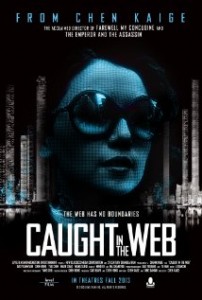[This originally appeared on www.moviewallas.com]
It’s a great hook for a film: a young woman on a public transport bus refuses to give up her seat to an elderly passenger. The incident gets recorded on a camera phone and the video goes viral when posted online. The repercussions play out.
 Kaige Chen, best known to western audiences for helming FAREWELL MY CONCUBINE, takes on this story in his latest film CAUGHT IN THE WEB. And disappointingly misses the mark. This is a contemporary story set in a gleamingly urban China. But what should have been a brutal, unrelenting satire on the pervasiveness of social media and its readiness to grant easy fame to anyone, instead becomes a springboard for an unnecessarily complex soap opera. Even more misjudged is the turn toward the end to a romanticized tragedy that feels entirely unearned.
Kaige Chen, best known to western audiences for helming FAREWELL MY CONCUBINE, takes on this story in his latest film CAUGHT IN THE WEB. And disappointingly misses the mark. This is a contemporary story set in a gleamingly urban China. But what should have been a brutal, unrelenting satire on the pervasiveness of social media and its readiness to grant easy fame to anyone, instead becomes a springboard for an unnecessarily complex soap opera. Even more misjudged is the turn toward the end to a romanticized tragedy that feels entirely unearned.
The film starts with the incident on the bus and then delves into the lives of the young woman in the video, her caricature of a patriarchal boss, and his privileged but disengaged wife. And also the wannabe journalist who filmed the video, her ambitious boss (who tries to push the story as her own), and the boss’ boyfriend. And the movie spends much of its time running the plot through these characters in mostly predictable ways.
Did the filmmakers not recognize the full potential of their initial premise? How could a seasoned filmmaker squander a concept this ripe for exploration? Or was this a case of an incisive original script that got overridden during the production of the movie. Consider for example, SPRING BREAKERS, which takes off from a similar headspace but leaps into a gonzo, depraved tone right off the bat, and then sustains it. Or consider any episode of 30 ROCK where the satire comes with the tongue permanently stationed in the cheek. I wish CAUGHT IN THE WEB had followed either approach. But the tone in this film starts off deadpan then settles on telenovela camp before ending on staged sincerity; it doesn’t all fit together. Perhaps it was because I was so enamored with the original hook that I was disappointed to realize that the film’s ambitions do not run deep at all.
Stylistically, CAUGHT IN THE WEB is structured with deliberate stiltedness. Shots are cut close to each other, often with exaggerated camera angles, and they leap forward in time in quick succession. This sort of cutting might work well for a film that is overtly spoofing a genre, but not for a movie that settles into a very traditional narrative as it progresses. So the stylistic choice remains a gimmick.
The movie attempts to comment on how our judgment of an individual might change as we find out more about that person. That the pivot for our moral assessment of a character could turn completely as we became privy to more truths. But this is not an entirely successful exercise in CAUGHT IN THE WEB, especially compared to the masterful delicacy with which this was accomplished in the wonderful A SEPARATION from last year. Better yet, one need only look at another film playing in cinemas right now, the stellar LE PASSE (THE PAST), from the same director (Asghar Farhadi) as A SEPARATION. Notice how Farhadi’s films effortlessly comment on the inscrutable nature of truth. I realize I am writing about CAUGHT IN THE WEB, but why not spend your twelve dollars to see the sublime and vastly superior LE PASSE (THE PAST) instead. Now that is a film that knows how to spin a web around its characters.
CAUGHT IN THE WEB is currently streaming live on Netflix.
No comments:
Post a Comment